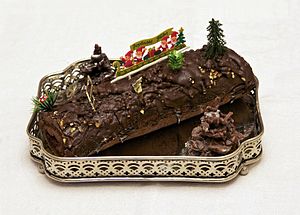
Toady in our series looking at the Christmas traditions of the many nationalities that make up Jersey, we're focusing on France.
At one time, they were the biggest ethnic group living in the island but their numbers have steadily decreased. Now there are around 1,000 - that's fewer than the number of Portuguese or Poles.
Myriam Kodische was born in Poitou-Charentes in south-western France and came to live in Jersey in February 2016.
She’s a teacher with the Alliance Française – an organisation that promotes France and all things French, and has more than 1,000 establishments in 136 countries on all five continents, including Jersey. It was set up locally in 1996 and is situated in Library Place just off the Royal Square.
“Christmas in France is a big family affair,” she says.
“Coming from a Catholic family there’s a steady build-up to the big day. It starts with Advent (four weeks of preparation for the arrival of Jesus Christ). Each Sunday we light one of the five candles of the advent wreath, leaving the fifth candle to be lit on the day itself.
“Then on the 24 December we gather as a family and go to church. Where I live we don’t go to midnight mass, it’s usually earlier in the evening. We’re normally back home for dinner at around 18:30. It’s a sumptuous affair. Traditionally we have canapés, seafood (a mini 'fruits de mer' plate of seafood such as lobsters, crabs, oysters, shrimps, whelks, and winkles with condiments such as mignonette sauce, cocktail sauce, and lemon). This is accompanied by champagne. For dessert there’s a chocolate sponge cake called a bûche de Noël. After midnight, when dinner’s finished, we open our presents.”
Myriam’s years of living abroad though have influenced her traditional French Christmas. “I bring Christmas crackers over,” she says, “and I’ve introduced the family to Christmas songs by the likes of Frank Sinatra, Bing Crosby and Dean Martin.”
The family lie in until mid-morning on the 25. Then the eating starts in earnest. “Christmas lunch lasts for ever,” she says with a smile, but you can see she enjoys it! “We sit down at 12:30 and leave the table when we are full at around 17:00.” As a starter they usually have Coquille St Jacques – scallops with mashed potato and cheese – with a white wine, normally from Anjou. That’s followed by a meat course – sometimes turkey but often lamb – with roast or dauphinois potatoes, and vegetables – served with a red wine. Then comes a palate cleanser – a trou lorrain – a mirabelle (a sweet yellow plum-like fruit that is a variety of greengage) sorbet with mirabelle liqueur poured over it. It’s followed by cheese and red wine. Then comes desert the Christmas log, and then a digestive.

Pictured: Christmas log - a traditional French desert on the big day.
Often it’s then tv time. Like Britain, France has a number of classic Christmas movies. One of them is Le Père-Noël est une ordure – as one website puts it – "the story of two neurotics, working for a suicide hotline on the night of Christmas Eve, who get caught up in a catastrophe when a pregnant woman, her abusive boyfriend, and a transvestite visit their office."
The celebrations carry on into the New Year to January 6, the Epiphany, the day the three kings or wise men visited Jesus in the stable. The French call it the 'Fête des Rois.' One tradition associated with it is a special flat almond cake called Galette des Rois. Hidden inside is a fève – or trinket. The cake is cut into slices and whoever gets the fève – is king or queen for the day. But, there’s often a penalty as well: they’re expected to buy the next cake. In many workplaces the tradition carries on until the end of the month.
Comments
Comments on this story express the views of the commentator only, not Bailiwick Publishing. We are unable to guarantee the accuracy of any of those comments.